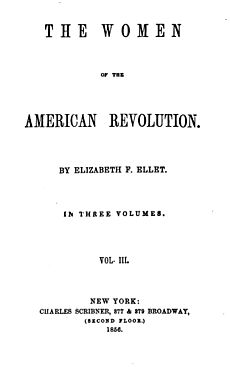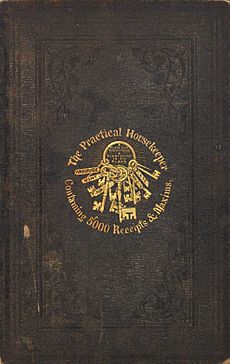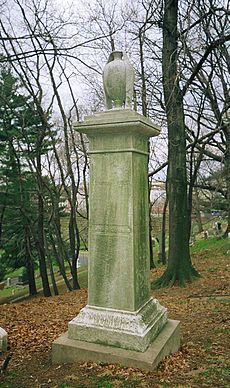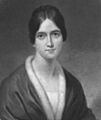Elizabeth F. Ellet facts for kids
Quick facts for kids
Elizabeth Fries Lummis Ellet
|
|
|---|---|
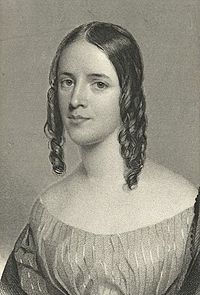 |
|
| Born |
Elizabeth Fries Lummis
October 18, 1818 Sodus Point, New York, U.S.
|
| Died | June 3, 1877 (aged 58) New York City, U.S.
|
| Occupation | Author, historian, poet, translator |
| Spouse(s) | William Henry Ellet (1806–1859) |
| Parent(s) | William Nixon Lummis (1775–1833) Sarah Maxwell (1780–1849) |
Elizabeth Fries Lummis Ellet (born October 18, 1818 – died June 3, 1877) was an American writer, historian, and poet. She was very important because she was the first writer to record the lives of women who helped during the American Revolutionary War.
Elizabeth Fries Lummis was born in New York. She published her first book, Poems, Translated and Original, in 1835. She married a chemist named William Henry Ellet. They moved to South Carolina. Elizabeth published many books and wrote for different magazines. In 1845, she moved back to New York City. There, she became a well-known part of the literary scene. Her most important work, The Women of the American Revolution, came out in 1845. This book had three parts and told the stories of patriotic women from early American history. She kept writing until she passed away in 1877.
Early Life and Education
Elizabeth Fries Lummis was born in Sodus Point, New York, on October 18, 1818. Her mother was Sarah Maxwell. Sarah's father, John Maxwell, was a captain in the American Revolutionary War.
Elizabeth's father was William Nixon Lummis. He was a respected doctor. He bought a large estate in Sodus Point, New York. Elizabeth went to Aurora Female Seminary in Aurora, New York. She studied subjects like French, German, and Italian. When she was 16, she published her first work. It was a translation of Euphemio of Messina by Silvio Pellico.
Writing Career Begins
In 1835, Elizabeth Lummis published her first book. It was called Poems, Translated and Original. This book included her play, Teresa Contarini. The play was about the history of Venice and was performed successfully in New York. Around this time, she married William Henry Ellet. He was a chemist from New York City. The couple moved to Columbia, South Carolina. William became a professor of chemistry at South Carolina College in 1836.
While living in South Carolina, Elizabeth published several books. In 1839, she wrote The Characters of Schiller. This book was about the writer Friedrich Schiller. It also included her translations of many of his poems. In 1840, she wrote Scenes in the Life of Joanna of Sicily. This book shared the history of noble women. She also wrote Rambles about the Country. This book described the beautiful places she saw during her travels in the United States. She continued to write poems, translations, and essays. These were published in popular magazines like the American Monthly and the Southern Literary Messenger. Elizabeth wrote a lot and in many different styles.
In 1845, Elizabeth Ellet moved back to New York City. She became an active member of the city's literary community. She joined other famous writers like Margaret Fuller and Edgar Allan Poe.
The Women of the American Revolution
Around 1846, Elizabeth Ellet started a very important history project. She wanted to tell the life stories of women who helped and sacrificed for the American Revolution. To do this, she looked for old, unpublished letters and diaries. She also interviewed the family members of women from the Revolutionary era. She was the first historian of the Revolution to do this kind of research.
Elizabeth noticed that there was a lot of information about the history of men's actions. She wanted to balance this by telling the women's side of the story. She believed that the founding "mothers" helped teach a love for freedom. This love later grew strong and helped light up the world.
She found so much information about these patriotic women. Because of this, the first edition of The Women of the American Revolution (1848) had to be published in two books. People liked these books a lot. So, a third book with more stories was published in 1850. Today, historians think these books are her most important work. Elizabeth also wrote Domestic History of the American Revolution in 1850. This book summarized the same information in a story form.
Elizabeth told the stories of women from every colony. She included women from all parts of society, except for African Americans. Some women she wrote about were already famous, like Martha Washington and Abigail Adams. She also wrote about less famous but equally important women. These were the wives of heroes who bravely raised their children and defended their homes during the war. She wrote that it was almost impossible to understand how much women's patriotism influenced the new country.
More of Her Work
After becoming a respected author, Elizabeth Ellet continued to write. In 1849, she wrote Family Pictures from the Bible. In 1850, she wrote Evenings at Woodlawn, which was a collection of German legends. She also wrote Domestic History of the American Revolution. This might be the only history of the American Revolution told from both men's and women's points of view.
From 1851 to 1857, she wrote several other books. These included Watching Spirits, Pioneer Women of the West, Novelettes of the Musicians, and Summer Rambles in the West. The book Summer Rambles in the West was inspired by a boat trip she took on the Minnesota River in 1852. The town of Eden Prairie, Minnesota, got its name from Elizabeth Ellet. They even have a nature trail named after her.
In 1857, Elizabeth published a large book called The Practical Housekeeper. It was about managing a home. This guide was for middle to upper-class readers. It had three parts: cooking, housekeeping, and health. It included thousands of recipes and advice. It also had five hundred pictures. She wrote that no complete guide to running a home had been published in America before.
Her later books included Women Artists in All Ages and Countries (1859). This was the first book of its kind to tell the history of women artists. She also wrote The Queens of American Society (1867) and Court Circles of the Republic (1869). This last book looked at the social life of eighteen presidents, from George Washington to Ulysses S. Grant.
Later Years and Legacy
In 1850, Elizabeth and her husband moved to New York City. Her husband worked there as a chemical consultant until he passed away in 1859.
Elizabeth continued to write. Even though they had no children, she supported charities for women and children in need. She gave public speeches to help raise money for these causes. She was an Episcopalian for most of her life. Later, she became a Catholic. She died in New York City on June 3, 1877, from a kidney disease called Bright's disease. She was buried next to her husband in Green-Wood Cemetery in Brooklyn.
Elizabeth Ellet was the first historian to write about how women were involved in the American Revolution. She believed that women shaped history through their influence and feelings. She felt this was hard to explain, saying "History can do it no Justice." Her book The Women of the American Revolution is still studied today.
List of Works
- Euphemio of Messina (1834) a translation
- Poems, Translated and Original including the play Teresa Conarini (1835)
- The Characters of Schiller (1839)
- Joanna of Sicily (1840)
- Rambles about the Country (1840)
- The Women of the American Revolution (1848–50) (3 volumes)
- Evenings at Woodlawn (1849)
- Family Pictures from the Bible (1849)
- Domestic History of the American Revolution (1850)
- Watching Spirits (1851)
- Nouvelettes of the Musicians (1851)
- Pioneer Women of the West (1852)
- Summer Rambles in the West (1853)
- The Practical Housekeeper (1857)
- Women Artists in All Ages and Countries (1859)
- The Queens of American Society (1867)
- Court Circles of the Republic (1869)
Images for kids
See also
 In Spanish: Elizabeth F. Ellet para niños
In Spanish: Elizabeth F. Ellet para niños


